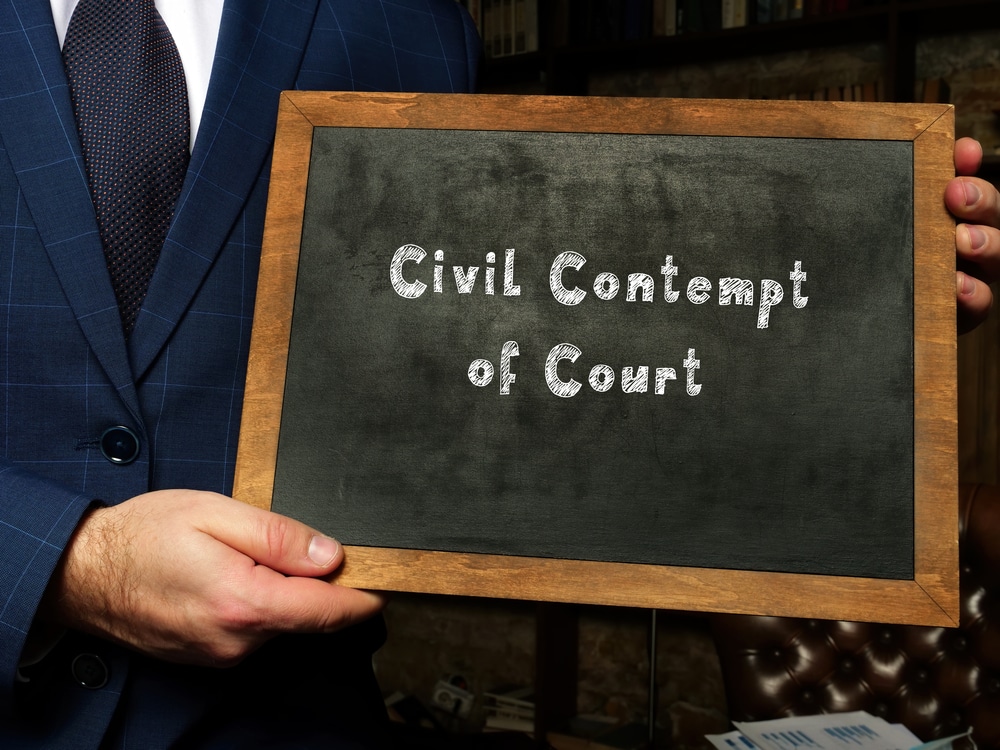How to Manage Your Contempt Charges with the Help of an Experienced Criminal Law Attorney
Being charged with contempt of court can significantly impact your life and result in punishments as severe as jail time, a fine, or even a felony conviction on your permanent record.
 Although a person can be charged with contempt for inappropriate behavior which delays or disrupts court proceedings, very often a person can be charged with contempt as the result of violating a temporary restraining order (TRO) or final restraining order in simple assault or domestic violence cases. They can also be found in contempt for violating a family law court order related to child support or in problematic divorce cases where equal distribution of assets, property division, or alimony/spousal support agreement are an issue. In other cases, contempt charges may be brought for failing to appear in court or respond to a court summons.
Although a person can be charged with contempt for inappropriate behavior which delays or disrupts court proceedings, very often a person can be charged with contempt as the result of violating a temporary restraining order (TRO) or final restraining order in simple assault or domestic violence cases. They can also be found in contempt for violating a family law court order related to child support or in problematic divorce cases where equal distribution of assets, property division, or alimony/spousal support agreement are an issue. In other cases, contempt charges may be brought for failing to appear in court or respond to a court summons.
If you or someone you know has been charged with contempt of court in New Jersey, or if you or a loved one is seeking to enforce a court-mandated order against a co-parent for child support, child custody agreement, or failure to honor a marital agreement, it’s best to retain experienced legal representation. No matter how minor the violation may seem, we can help you protect your rights. Our defense attorneys approach agreement resolution with a collaborative and amicable mindset, but will not hesitate to aggressively defend you in court.
At The Bronzino Law Firm, LLC, we have extensive experience protecting our clients’ rights and finding realistic and effective solutions for any legal matter in local Ocean County and Monmouth County communities, including Brick, Spring Lake, Sea Girt, Howell, Wall, Point Pleasant, Toms River and all of Southern New Jersey.
Contact us online or call our office today for a free and confidential consultation regarding your questions and concerns or for any other family law matter.
What Constitutes Contempt of Court in New Jersey?
At its foundation, court contempt of court occurs when someone deliberately violates court order, does something to intentionally prevent a court order from being exercised, acts inappropriately in court, or disrespects the judge while court is in session, or behaves in a disrespectful manner while court is in session.
Even if the contempt violations were unintentional or committed in good faith, and may seem as minor as making contact via text message, a social media post, email, or a phone call, the state may move forward with charging that person with a disorderly persons offense.
What is the Difference Between Civil and Criminal Contempt in New Jersey?
Although there are numerous ways to be found in contempt of court, it is generally differentiated between direct and indirect criminal contempt and civil contempt.
Direct contempt is considered inappropriate behavior (i.e., offensive language or not following court rules or decorum) that occurs in front of the judge, which is dealt with on the spot. Indirect contempt occurs outside the presence of a judge and may involve a lawyer or juror willfully violating a judicial order, such as a “gag order” to not discuss the case or court proceedings outside of court. Proving this type of offense requires the court to rely on third-party testimony.
Civil contempt of court charges, on the other hand, are often brought after the plaintiff files a suit against a defendant for financial damages or injunctive relief from the court. Typically examples are failure to obey a restraining order, pay child support, follow parental visitation orders, or a divorce decree.
Another distinction between civil and criminal contempt of court charges is the constitutional safeguards a person charged with criminal contempt has. Whereas criminal contempt is subjective and must be proven beyond a reasonable doubt, civil contempt must be proven by clear and convincing evidence.
What are the Penalties for Contempt in New Jersey?

Depending on the situation, violating a court order can be classified as a disorderly persons offense or a fourth-degree criminal offense, especially if one commits another crime while violating the order. Although the threat of jail is often enough to gain compliance with a court order, the court may impose community service, wage garnishment, fines, drug or alcohol treatment, or loss of driving privileges.
Whether it’s yourself or someone you know, violating a restraining order in New Jersey can be classified as a fourth-degree criminal offense or a disorderly persons offense.
A disorderly persons offense in New Jersey is punishable by:
- Fine: up to $1000
- Incarceration: 6 months in the county jail
- Criminal Record: a conviction will appear on your criminal record
A fourth-degree felony in New Jersey is punishable by:
- Fine:up to $10,000
- Incarceration: up to 18 months in New Jersey State Prison
- Probation: an extensive probationary period
- Criminal Record: a felony conviction appearing on your criminal record
In family law matters, when one party knowingly refuses or fails to follow a court order it can result in additional stress, confusion, and possibly fear for one’s safety and wellbeing. If the alleged contempt of court violation is significant, you should seek to remedy this immediately.
If you have concerns or questions about a possible contempt of court case, contact an experienced Ocean County family law attorney for advice.
Contact a Brick, NJ Attorney About Your Contempt of Court Case Today
Punishment for a contempt offense can be significant. So whether you failed to appear in court, behaved inappropriately while in court, or unknowingly violated a court order, you will need a skilled Brick, NJ defense attorney to fight your charges.
If you have been charged with contempt in New Jersey or seek to enforce an existing court order, it is imperative that you speak with an experienced criminal defense lawyer, so that you can explore all of your available options. Regardless of how small you think the violation may be, failure to take aggressive action can direly impact your life for years to come.
At The Bronzino Law Firm, LLC, our experienced criminal defense attorneys have extensive experience helping clients in local Ocean County and Monmouth County communities including Seaside Heights, Fort Dix, Keansburg, Howell, Wall, Beachwood, Tinton Falls, and other Jersey Shore communities. Our firm is built on the foundation of strong attorney-client relationships which larger firms simply cannot match.
Please contact us online today or through our Brick, NJ office at (732) 812-3102 for a free and confidential consultation.







